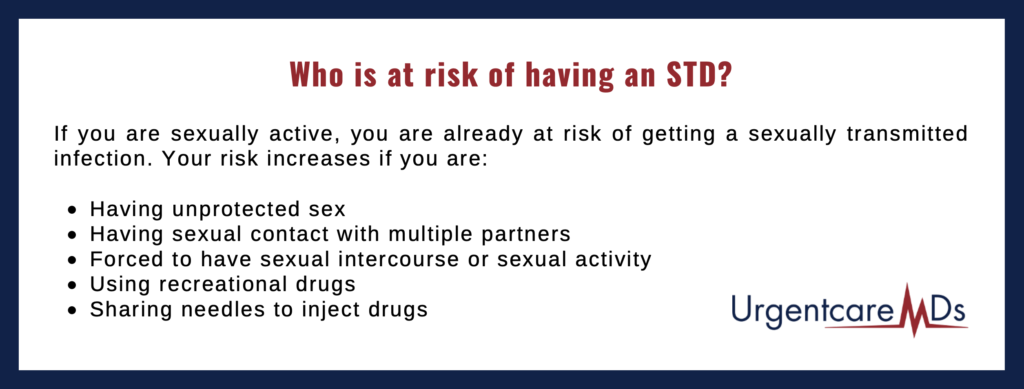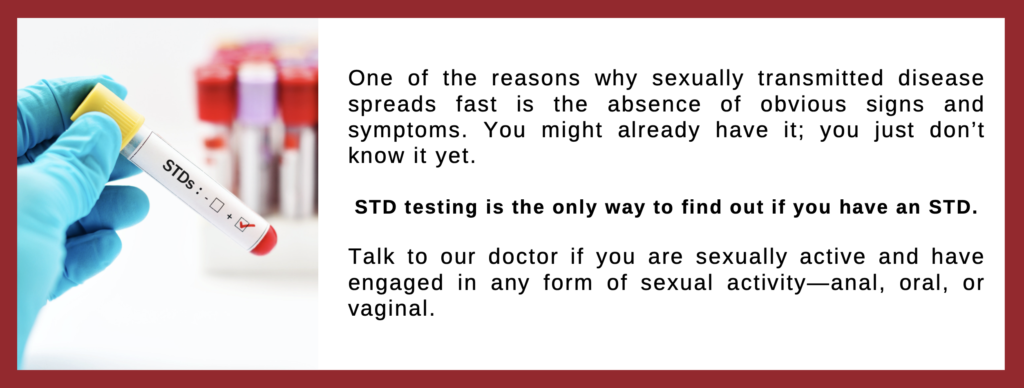Everything You Need to Know about STD Testing in Baytown & Crosby, TX
Did you know that approximately 68 million people in the United States have Sexually Transmitted Infections (STI)? That’s 1 in every 5 Americans, according to the Centers for Disease Control and Prevention (CDC). In 2018 alone, 26 million new STI cases were recorded; 50% of these new cases were diagnosed among people aged 15-24 years old.
One of the reasons why sexually transmitted disease spreads fast is the absence of obvious signs and symptoms. You might already have it; you just don’t know it yet. STD testing is the only way to find out if you have an STD. Talk to our doctor if you are sexually active and have engaged in any form of sexual activity—anal, oral, or vaginal.
Who is at risk of having an STD?
If you are sexually active, you are already at risk of getting a sexually transmitted infection. Your risk increases if you are:
- Having unprotected sex
- Having sexual contact with multiple partners
- Forced to have sexual intercourse or sexual activity
- Using recreational drugs
- Sharing needles to inject drugs
Who needs STD testing in Baytown and Crosby?
The earlier an STD is diagnosed, the sooner patients can get the necessary treatment and precautions they need to manage the disease. The CDC recommends STD testing for:
- Adults and teenagers aged 13 to 64 years old should get an HIV (human immunodeficiency virus) test at least once in their life.
- Sexually active women aged 24 years old and below should get an annual test for gonorrhea and chlamydia.
- Sexually active women with multiple sex partners (or a partner diagnosed with STD) should get an annual test for gonorrhea and chlamydia.
- Pregnant women at their early stage of pregnancy should be tested for hepatitis B, HIV, and syphilis.
- Sexually active members of the LGBT community, particularly bisexuals and gays, should be tested for chlamydia, gonorrhea, HIV and syphilis at least once a year. Those with multiple sexual partners should be tested every 3 to 6 months.
- Those who engage in recreational drug use and share injection needles should get an HIV test annually.
If you think you are one of these, book an appointment for an STD test at Urgent Care MDs in Baytown or in Crosby, TX. Don’t wait until you have developed worse signs and symptoms, or it might be too late.
What are the Signs and Symptoms of STDs?
Most people get tested when they experience signs and symptoms suggestive of STDs. Although the symptoms may seem mild and resolve on their own, it doesn’t mean that the STD is cured.
Different diseases manifest differently in different patients. The most common signs and symptoms of STDs include:
- Sores, lesions, or bumps on the genitals, buttocks, or thighs
- Smelly vaginal or penile discharge
- Burning sensation when peeing
- Itchiness or pain in your private parts (anus, vagina, penis)
- Pain during sexual intercourse
- Fever and body aches
- Feeling exhausted
- Swollen lymph nodes in the groin
These manifestations may also be caused by other diseases such as urinary tract infection and yeast infection. STD testing can help your doctor arrive at an accurate diagnosis, which will guide your course of treatment.
STD testing in Baytown and Crosby: How is it done?
During your consultation, our doctor will take your medical history and ask you about your signs and symptoms. Your doctor also needs to take your sexual history by asking specific questions about your sexual contact, the number of sexual partners you have, and condom use, among others.
Each STD has its own unique test. The type of test you need will depend on your doctor’s findings during the interview and initial assessment. The tests are generally quick and painless and may include the following:
- Urine test.
You need to collect your urine in a cup. Your specimen will be analyzed to detect chlamydia and gonorrhea.
- Cheek swab.
You have to rub a soft swab into the inside of your cheek. This test can detect HIV.
- Blood test.
This is done either through blood draw or finger prick technique. This can detect Herpes, Hepatitis B, HIV, and Syphilis.
- Cultures.
A sample of fluid from your sores is taken using a cotton swab. Your doctor may also get some discharge samples coming from the anus, penis, vagina, or throat. The specimens will be examined under a microscope to determine the presence of bacteria and viruses.
- Physical examination.
Your doctor examines your private area to assess the appearance and location of sores and the consistency of discharge.
Common Sexually Transmitted Diseases
Chlamydia
Chlamydia, the most common STD that affects Americans, is a genital infection caused by Chlamydia trachomatis bacteria. It is usually spread through sexual contact and can be passed to the baby during childbirth. This disease can be treated through antibiotic therapy.
Gonorrhea
Also known as “the clap,” gonorrhea is a bacterial infection caused by Neisseria gonorrhoeae. It can be easily spread from one person to another through vaginal, anal, or oral sex. If left untreated, gonorrhea can lead to serious complications and infertility. Like chlamydia, it can also be passed down to the baby during childbirth.
Genital and oral herpes
Genital herpes is a common sexual disease. It is transmitted through the infection of one partner to another by way of oral, vaginal, and anal sex. This type of STD can also be passed from someone with an active case to another by kissing or close contact. When the herpes simplex virus enters your system, it takes time before the symptoms show up.
A woman with herpes can pass down the disease to her baby in the womb or during childbirth. This disease has no cure and the treatment is geared towards controlling outbreaks and managing pain.
Hepatitis B
You can contract Hepatitis B through direct contact with the body fluids of an infected person (blood, vaginal fluids, semen). Having multiple sexual partners and sharing needles are common risk factors for the disease. Patients with Hepatitis B suffer from extensive liver damage.
This disease can be prevented through vaccination and may resolve on its own without treatment. However, in chronic and severe cases, patients may suffer from extensive liver damage that needs medication or a liver transplant.
HIV
HIV stands for Human Immunodeficiency Virus. It is the virus that can cause AIDS, or Acquired Immune Deficiency Syndrome. This syndrome breaks down the body’s natural defenses against infections and diseases. There are many different ways to spread HIV, but it is most commonly transmitted through sexual contact with an infected person. You may also get HIV by sharing needles during recreational drug use.
Syphilis
Syphilis is a bacterial infection caused by Treponema pallidum. It is usually spread through unprotected sex with an infected person and sharing of needles. An infected mother can also transfer it to her baby during pregnancy, childbirth, and breastfeeding.
Syphilis starts as a painful sore on the genitals or mouth. Penicillin is the drug of choice for this disease.
Where to get an STD test near me?
Urgent Care MDs offers STD testing in our Crosby and Baytown,TX, clinics. Whether you want to get an STD test as part of your routine exam, or you are worried about the cause of the symptoms, don’t hesitate to visit any of our locations.
If you have any questions, feel free to contact us or call us:
- STD testing Baytown: (281) 428-0000
- STD testing Crosby: (832) 821-9780
Our friendly staff and qualified doctors will give you high-quality care and treat your information with the utmost confidentiality.
The material contained on this site is for informational purposes only and DOES NOT CONSTITUTE THE PROVIDING OF MEDICAL ADVICE, and is not intended to be a substitute for independent professional medical judgment, advice, diagnosis, or treatment. Always seek the advice of your physician or other qualified healthcare providers with any questions or concerns you may have regarding your health.


